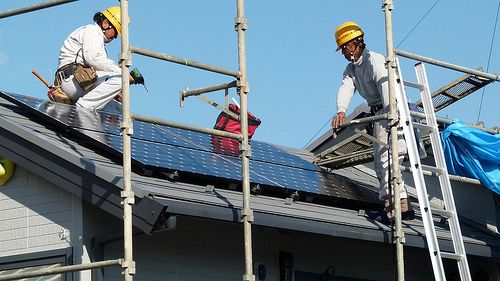UN: We “can and must do more with less”
People must learn to do more with less, to protect natural resources against depletion. A new UN report found that by 2050 humanity could consume around 140 billion tonnes of natural resources per year, and called for a decoupling of recourse consumption rates from economic growth rates.

 People must learn to do more with less, to protect natural resources against depletion, according to the UN.
People must learn to do more with less, to protect natural resources against depletion, according to the UN.
The UN Environment Programme (UNEP) has identified that by 2050, humanity could consume around 140 billion tonnes of minerals, ores, fossil fuels and biomass per year – three times current amounts.
They call for the economic growth rate to be “decoupled” from the rate of natural resource consumption, in order to protect against such large-scale consumption, and depletion of resources – and they say it is possible.
Achim Steiner, UNEP’s executive director said: “People believe environmental ‘bads’ are the price we must pay for economic ‘goods’. However, we cannot, and need not, continue to act as if this trade-off is inevitable.”
“Decoupling is part of a transition to a low carbon, resource efficient Green Economy needed in order to stimulate growth, generate decent kinds of employment and eradicate poverty in a way that keeps humanity’s footprint within planetary boundaries.”
In developed countries, citizens consume an average of 16 tonnes of key resources per capita – up to 40 tonnes per person in some developed countries – while the average person in India consumes four tonnes per year.
With growth accelerating, especially in developing countries, much higher levels are expected in the future, “far beyond what is likely sustainable” said the report; already the world is running out of cheap and high quality resources.
The report states that people have to learn to do more with less; improving resource productivity faster than the economic growth rate. However they warn this demands an urgent rethink of the links between resources and economic prosperity, to at least freeze per capita consumption in wealthy countries and help developing countries find a more sustainable route.
They find hope in the move towards urbanisation, as densely populated areas tend to consumer fewer resources per capita, due to greater efficiency delivering: water, housing, waste management, energy use and transportation.
However, many raise concerns over the capacity for this to happen. ‘The rebound effect’ is used to describe an energy saving in one area causing more energy use in another – for example more energy-efficient fuel, would mean people drive more. If more densely populated areas can be made more efficient it could, some believe, lead to people doing more and therefore using more resources.
As trade expands it also becomes more difficult to assign responsibility of resource use –crucial if each country is to be asked to limit per capita consumption. While there continues to be wide discrepancies in per person consumption in different regions, levels of action will also vary.
While not offering detailed policy and technology options, the reports argues that technologies that have helped extract ever-greater quantities of natural resources should be made more efficient.
It also points towards some positives. They argue that resource shortages will eventually drive countries to act and stay ahead of the game, while in developing countries the resource-intensive processes can be skipped while they develop more sustainable methods of growth.
The report produced by UNEP’s International Resource Panel and launched at the annual meeting of the UN Commission on Sustainable Development. This precedes the global UN Conference on Sustainable Development next year in Rio (Rio +20) which will look at the themes of the Green Economy and an international framework for sustainable development.
Steiner said: “Next year’s Rio +20 meeting represents an opportunity to accelerate and scale-up these ‘greenshoots’ of a Green Economy, which are emerging across the developed and developing world.”
Image: Co Creatr | flickr





